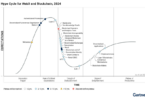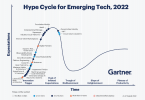As Gartner reported on the 23rd June, the blockchain space has never seen a firm with the finances and userbase of Facebook adopt the technology. Libra, the social media giant’s blockchain initiative, aims to be a global cryptocurrency. With Facebook and the other high profile companies signed up, it will be made available to nearly two billion users upon launch. This massive release, as Gartner predicted last year, will bring with it crypto-politics and hybrid centralized and decentralized systems.
The leading enterprise advisory firm published a report in September of last year on how the ‘World Wide Ledger’ (WWL) will emerge from the development of distributed ledger technologies. Gartner compared this emergence, as the rate of blockchain innovation is so high, with the beginnings of the World Wide Web (WWW).
As the WWW enables businesses to operate online, the report predicts that the WWL will be the foundation of decentralized businesses. In the same way that companies created websites and online stores as the internet saw wider adoption, they will create decentralized business units.
Indeed, Facebook founded its blockchain arm Calibra as a subsidiary to exploit the opportunities that the new Libra Network will create. Since it is a separate entity to the firm, Calibra could be a decentralized unit of the centralized company. Yesterday’s post by Gartner points out that Facebook’s initiative is no mere experiment; it is not limited by testing conditions, and certainly not by budget or audience.
“The world needs a hybrid of centralized and decentralized systems to establish balance and stability because of human needs and behaviors,” stated Gartner’s 2018 report.
“However, current centralized systems, such as traditional institutions, computing platforms and social networks, have caused many challenges that require a counterbalance with decentralized systems.”
In the wake of Libra’s recent announcement, some legislative bodies and central banks have voiced their skepticism of the cryptocurrency. While Bitcoin, for example, drew comments from lawmakers in the past, Libra is being more widely and fervently discussed. This tense dynamic between politics and business heralds a new age Gartner calls crypto-politics.
Crypto-politics is characterized by virtual entities and their communities vying for influence and position against competitor networks. This could cause a shift from traditional geographic lines of conflict to digital ones. Many geographically scattered firms will provide verification nodes on the Libra blockchain.
“This power shift will create different friction points that magnify crypto-political and crypto-digital competition as traditional and autonomous entities try to broaden their span of influence and/or recentralize power,” Gartner’s report explained.
Yesterday’s post recommends that organizations take advantage of this “unique” period, planning for a decentralized future over the next decade. Like many underestimated the power of the internet, Gartner warns not to underestimate the influence of the WWL.






